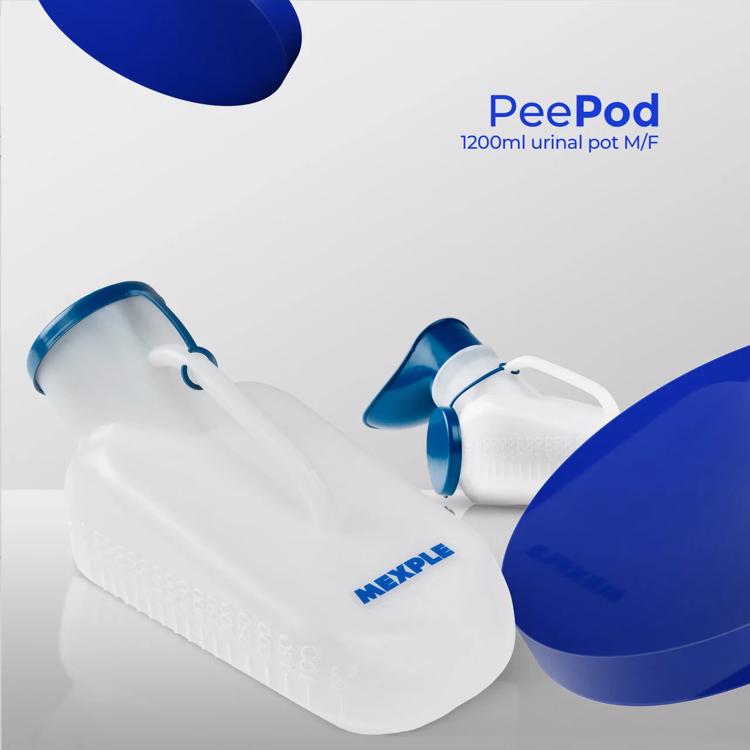Beyond Dawlish
Caring for individuals with limited mobility or medical conditions that affect bladder control often requires special tools and aids. One such essential item is a urinal bottle. While it may seem like a simple device, selecting the right one can greatly impact the comfort, hygiene, and independence of the patient, as well as the ease of care for the caregiver. In this guide, we walk you through everything you need to know to choose the right urinal bottle.
What Is a Urinal Bottle?
A urinal bottle is a portable container used for collecting urine. It is most commonly used by individuals who are bedridden, have limited mobility, or are undergoing recovery. Urinal bottles are particularly useful in hospitals, care homes, and for home care patients. They come in various sizes, shapes, and materials to accommodate different needs.

Why Choosing the Right Urinal Bottle Matters
For caregivers, having the right type of urinal bottle can:
-
Reduce the risk of spillage and mess
-
Improve patient comfort and dignity
-
Simplify nighttime bathroom routines
-
Help avoid injuries related to patient transfers
Choosing the wrong urinal bottle, on the other hand, can lead to discomfort, inconvenience, and even infection risks.
Key Considerations When Selecting a Urinal Bottle
1. User Gender
Urinal bottles are typically gender-specific because of anatomical differences.
-
Male urinals generally have a long, narrow neck and a wide opening.
-
Female urinals are designed with a contoured shape to fit snugly and minimize spillage.
-
Unisex options also exist and are suitable for some use cases but may not be as comfortable or efficient as gender-specific designs.
2. Material
Most urinal bottles are made from either plastic or stainless steel.
-
Plastic: Lightweight, cost-effective, and often disposable or for short-term use. Transparent plastic helps monitor output easily.
-
Stainless Steel: Durable, easy to sterilize, and suitable for long-term use. Heavier, but offers greater durability.
3. Capacity
The average urinal bottle holds around 1000ml of liquid. Consider the user’s output and how often the bottle will be emptied.
-
Higher capacity bottles are useful for overnight use or for users with limited caregiver availability.
4. Ease of Handling
Look for bottles with:
-
Ergonomic handles for both the user and caregiver
-
Spill-proof lids or anti-reflux valves
-
Clear volume markings for medical monitoring
5. Portability and Storage
If the urinal needs to be carried or stored frequently, opt for foldable or compact models that come with storage bags.
6. Cleaning and Maintenance
-
Reusable urinals should be easy to clean, preferably autoclavable or compatible with disinfectants.
-
Single-use urinals are better for temporary care or in settings where hygiene is paramount.
Types of Urinal Bottles
a. Standard Male Urinal Bottle
Simple in design and typically made of transparent plastic. Includes a handle and a wide neck for easy use.
b. Female Urinal Bottle
Ergonomically shaped to fit the female anatomy. May include a larger spout and a handle to assist with positioning.
c. Spill-Proof or Anti-Tip Urinals
Feature lids or anti-spill valves to prevent leaks, making them ideal for travel or nighttime use.
d. Glow-in-the-Dark Urinals
Useful for nighttime visibility. These are often made from luminescent plastic and are great for those who need to urinate at night without turning on lights.
e. Disposable Urinals
Pre-sealed with absorbent material that gels urine. Best suited for travel, emergency kits, or short-term care.
Tips for Caregivers
-
Always maintain hygiene. Clean reusable bottles immediately after use.
-
Wear gloves during handling and cleaning.
-
Ensure proper positioning to avoid spills.
-
Encourage patient independence where possible for dignity.
-
Replace worn-out or discolored bottles regularly.
When to Consult a Healthcare Provider
Sometimes, frequent or unusual urination patterns might signal a medical condition. If you notice changes in urine color, output, or frequency, consult a healthcare professional. They might recommend catheterization or additional diagnostic tests.
Final Thoughts
Choosing the right urine bottle isn’t just about convenience; it’s about providing dignified, hygienic, and effective care. Whether you are a professional caregiver or taking care of a loved one at home, investing time in selecting the appropriate urinal bottle can make a significant difference.
At Mexple, we offer a diverse range of high-quality urinal bottles, designed for both patient comfort and caregiver convenience. Explore our collection today to find a product that best suits your needs and ensures hassle-free care every day.




